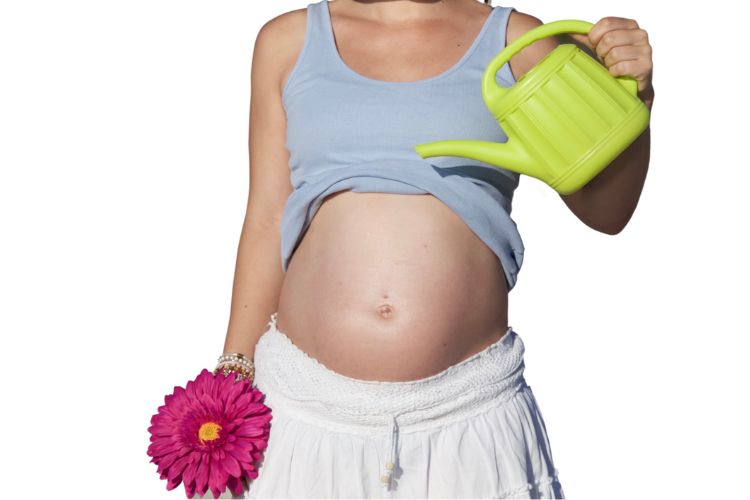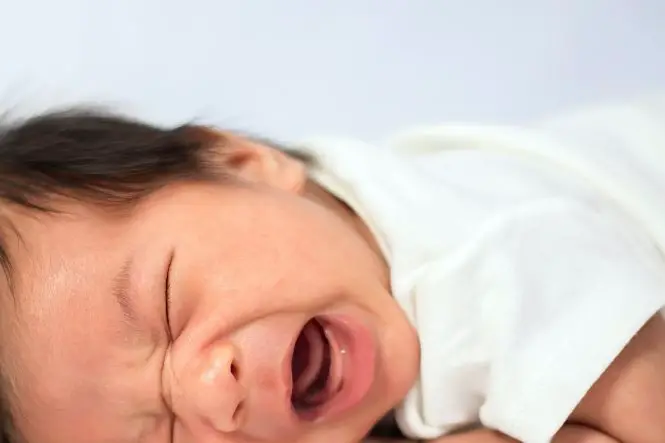While it’s not something people talk about often, flatulence–or farting–is a completely natural bodily function that everyone does. If you are a first-time parent, you might be surprised at how often or how loudly your little baby passes gas! While some flatulence is to be expected, if you think your baby has excessive gas there are a few things to look into.
There are lots of reasons that your baby may be farting a lot and it’s not always easy to figure out why. Sometimes it’s related to what they are eating or how they are eating, or in the case of breastfed babies, what the mother is eating. Excess gas can also be caused by medications that the mom or baby is taking.
An underdeveloped digestive system can also be the reason that your baby is passing a lot of gas. Too little movement, particularly in younger babies can also contribute to gas production. Colicky babies are also more likely to have flatulence because of the amount of air they swallow when crying.
Table of Contents
1. Allergy Or Sensitivity To Milk
Your baby may be passing a lot of gas if they have an allergy to the protein in cow’s milk or if they are lactose intolerant. It is important to rule these things out as they can not only interfere with your baby’s nutritional needs but in the case of an allergy, can be life-threatening. Lactose intolerance is an inability to digest lactose (milk sugar) and can cause flatulence, diarrhea, and stomach pain. It is more common in babies that are Native, African, South American, or Asian.
Cow’s milk allergy is one of the most common food allergies in babies, affecting about three percent of infants in their first year of life. If your child is allergic to cow’s milk, this means that her immune system is overreacting to the proteins, causing the body to release histamine. Symptoms of a cow’s milk allergy can include farting, diarrhea, vomiting, swelling, hives, rash, watery eyes, coughing, and wheezing.
Some babies outgrow their cow’s milk allergy as they get older while others do not. If you suspect that your child may be allergic to the protein in cow’s milk, ask your healthcare provider for a referral to an allergist. They will do a simple skin test to find out–you may need to carry an epi-pen that would need to be administered should your baby have an allergic reaction.
2. Baby Not Being Burped After Feeds
If your baby is farting a lot, there may be a simple solution–she might just need to be burped more after feeding! Babies need to be burped after each feed, whether they are breastfed or formula-fed. If they aren’t being burped, the gas will simply come out the other end.
Babies tend to swallow air when they are feeding and this gets trapped inside unless you burp them. After feeding your baby, hold her against your chest so that her chin just rests on your shoulder–putting a burp cloth on your shoulder first can catch the mess if your baby spits up. Use your hand to gently pat your baby on her back to help release the air inside.
The more frequently your baby spits up or the gassier she is, the more often you should burp her. Some babies do alright with just being burped at the end of feeding time. Others need to be burped after an ounce or two of formula or every 5-10 minutes if breastfeeding.
3. Digestive System Is Still Developing
Just like the rest of your baby, her digestive system is still developing and this may be the reason she is experiencing a lot of gas. It takes some time for all of the organs and muscles involved in the digestive process to develop and work efficiently. As your baby gets older you will probably notice that she does not fart as much as when she was younger.
The first time that your baby is breastfed or has formula is the first time any of her digestive organs have had to work! Up until this point, all of a baby’s nutrients were absorbed through the placenta and umbilical cord. When your baby is born and starts feeding, her stomach, intestines, and esophagus are just learning how to be a part of the digestion process.
All of us have healthy bacteria in our digestive system–this is sometimes called the gut microbiome. However, unlike an adult’s microbiome, a baby’s does not have a wide variety of bacteria just yet. This can explain some of the problems with digestion and is one of the reasons your baby might have gas.
4. Lack Of Movement
Your baby may be passing gas due to a lack of movement. The digestive system works more efficiently when people are engaging in physical activity. Since young babies spend a large part of the day sleeping, their digestive system does not function as well because they are laying down instead of moving.
This is more likely to be a cause of gas among babies who have not yet reached the crawling stage, which typically happens around 9 months of age. Once babies begin to crawl, they become more active which triggers the digestive organs to work more efficiently. You may notice that your baby tends to pass more gas when she is moving around as this tends to get things moving inside as well!
If your baby is too young to crawl, there are things that you can do to help the digestive system do its job. One of the best things to do if your baby is uncomfortable from too much gas is to lay her on her back and gently move her legs like she is pedaling a bicycle. This motion pushes against her belly and causes some of the trapped gas to be released.
5. Medication
If your baby is taking any type of medication, whether it is prescribed or over-the-counter, a side effect may be that it can cause bloating or gas. One medication that your baby may be taking that could cause this issue is an antibiotic. Prescribed for bacterial infections, which are not uncommon in babies, these medications can create excess gas in your infant.
Likewise, if mom is breastfeeding, her medications may cause the baby to have gas as well. Some pain medications, cholesterol drugs, and antidepressants can cause gas. If mom is taking any sort of fiber supplement or laxative product and breastfeeding, this could also be causing gassiness for the baby.
If you suspect that a medication may be causing your baby to have excess gas, check to see if this is one of the possible side effects. Speak with your healthcare provider about your concerns. They may suggest switching your or your baby to a different medication if it is causing distress for your infant.
6. Sensitive To Formula Type
If your baby is drinking formula, consider that this may be the culprit when it comes to excessive gas. There is a vast array of formulas available today and they may not all agree with your baby’s digestive system. You can try switching your baby to a different kind of formula to see if this improves things.
There are three main types of baby formula available: cow’s milk formula, soy formula, and protein hydrolysate formula. The majority of parents who use formula choose to start with cow’s milk formula while parents who are trying to avoid animal products or know that their infant has an allergy may opt to try one of the other kinds. There are also different kinds of formula made for babies who have certain medical conditions or who were born prematurely.
You can also try different forms to see if one type makes your baby less gassy. For instance, you can buy powdered formula, liquid concentrate, or ready-to-use formula. Other options are to try using enhanced formulas that have added probiotics, prebiotics, or omega-3 fatty acids.
7. Sensitive To Mom’s Diet If Breastfeeding
Just as babies can be sensitive to formula, they can also be sensitive to breastmilk based on what mom is eating. The composition of mom’s diet can impact the taste of the breast milk and how well your baby is able to digest it. Keep in mind that some babies do not seem to mind what mom eats while others tend to react to changes in her diet.
Leafy green vegetables such as spinach, kale, and collard greens can cause some breastfed babies to have gas. Beans and legumes are other foods that will sometimes create an excess of gas for breastfed babies. Spicy foods or dishes containing onion and garlic are also gas-producing in some babies.
If you think that your diet is causing your baby to have excessive gas, try keeping a record. Note what you eat and when, as well as when your baby is passing gas. You may be able to see a pattern with certain foods, at which point you can decide if you want to limit or restrict them from your diet while breastfeeding.
8. Swallowing Air While Crying
It’s no surprise that babies cry–some more than others–but did you know that while they’re doing all of that crying, they are also swallowing air? Not so much with the quieter, less chaotic cries but the loud, ongoing, more hysterical crying definitely results in air being swallowed. Colicky babies in particular end up swallowing a lot of air because they spend a greater amount of time crying.
When this air gets trapped inside, it builds up and can either be released through burping or passing gas. Young babies don’t burp much on their own, so in most cases, this air comes out through farting. You can help to relieve some of the trapped air by burping your baby after or during her cry as well as after regular feedings.
If your baby’s flatulence is mainly caused by excessive crying, try to address the crying as well. The main reason babies cry is because they are hungry. Other common reasons are that they have a wet or dirty diaper, they are tired, they are too hot or too cold, they are teething, they are overstimulated, or they are in pain or sick. Being able to determine the reason for your baby’s crying will help you to meet her needs.
9. Swallowing Air While Feeding
Similar to how babies can swallow air when they are crying, they can also swallow air when they are feeding. Luckily, there are things you can do to prevent this from happening while you are feeding your baby. If your baby tends to get gassy after eating, this could be an indication that you should make some adjustments in feeding technique.
If you are breastfeeding, the way in which your baby latches will impact how much air she swallows. If she has a loose, relaxed latch on the breast, she will be swallowing air as she feeds. Try to get your baby to have a deep latch when feeding–position her so that her nose is in line with your nipple and wait until she opens her mouth wide before guiding her onto your breast.
With bottle-feeding, there are a couple of things you can do to avoid the baby swallowing air. First, try to get bubbles out of the formula or breastmilk by tapping the bottom of the bottle on the table and then letting it sit for a minute. Next, when placing the bottle in your baby’s mouth, ensure that the nipple is always filled with milk and not air.
Final Thoughts
Seeing your baby uncomfortable from too much gas can be upsetting, so try to find the reason behind their flatulence. Whether your baby has a food sensitivity or allergy, has colic, or is reacting to a medication, there are things you can do to alleviate their discomfort. Sometimes it is a matter of trial and error to find out what is causing your baby’s problem, so be patient–your baby will be happier once you have addressed the issue.






